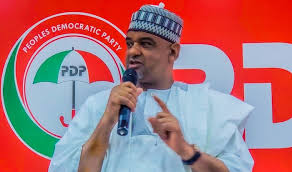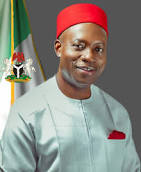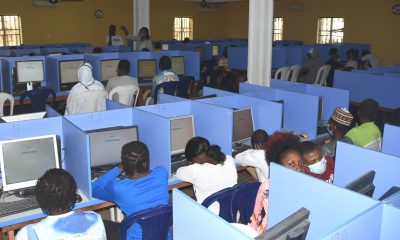NEWS
Recreating Nigeria to Avert Collapse

By Michael Owhoko
The root cause of Nigeria’s problem is, unarguably, an inappropriate system of government. Bad governance, poor economy, insecurity and corruption are just offshoots. It is absurd to pool people characterised by ethnic nationalism with diverse regional allegiance, cultures, interests and visions together under a central government, and expect to make progress.
Nigeria’s political structure is incompatible with its plural composition.As a multiethnic society, Nigeria has been struggling under a political framework that is unsuitable, anomalous, and inimical to its future, resulting in discordant policies and delivery setbacks. And until the political structure veiled in unitary configuration is discarded and replaced with federalism or, in the alternative, confederation, Nigeria risks collapse.
Nigeria is a hypothesis that has been undergoing experiments, which can now be confirmed to be unworkable due to an improper political system. After careful evaluation of its complex diversity, nothing is suggestive that the country can ever overcome its challenges with the current system. It is like using palm oil as a substitute for aviation fuel to power an aircraft, and expect it to fly. The country is on a wrong trajectory and incapable of producing any form of prospects unless there is a change of system.
The 1999 Nigerian Constitution is in structure, content, spirit and intent, a unitary constitution when viewed against the backdrop of the exclusive list which has 67 items and the concurrent list with 13 items, an indication of a strong centre and weak states. The constitution is incompetent to resolve Nigeria’s unending woes. It is antithetical to the essence of the country’s amalgamation, where hitherto different independent nations, now have their destinies determined and centrally regulated against their vision and values.
What Nigeria needs is a completely new constitution with features of federalism, characterised by decentralisation or devolution of powers to the federating units or regions, with authority over the control of natural resources in their domains, together with liberty to pursue their dreams and aspirations in line with their peculiar potentials, values and needs. This will enable them to develop at their own pace independently without any statutory interference from the centre.
Otherwise, the country can be restructured into a confederal system where the regions or federating nationalities should have the obligation to wholly manage their affairs, except for responsibilities relating strictly to the army, foreign affairs, currency, and perhaps, internal trade, which should be ceded to the central government to administer with full power and authority. These options are the only way Nigeria can be saved from a looming catastrophe, as the elasticity of endurance is waning fast.
Self-determination by agitators of Biafra Republic, Oduduwa Republic/Yoruba Nation, Niger-Delta Republic, Arewa Republic, and even the recent display and hoisting of Russian flags during the “End-Bad Governance Nationwide Protest” that was held from August 1 -10, 2024 in northern parts of the country, is evidence of widespread discontent arising from the current system of government.
Besides, as a consequence of the unitary system, there is a growing feeling of ethnic and regional subjugation among ethnic nationalities, resulting in system disloyalty. Policies enunciated by the government designed to reposition the economy, reform the political system, eradicate profligacies, and even eliminate terrorist organisations in the country are covertly frustrated with the complicities of persons from aggrieved regions or sections.
Put differently, differences in values, culture, heritage, tradition, history, language, geography and belief system, have led to a clash of visions, interests, goals and priorities among federating units or regions, which have further thrown up centrifugal forces that have held the country hostage. This is a complex inherent challenge and source of division in the country.
This portends danger and a signal of emerging trouble, particularly within the context of a young generation of persons whose opportunities, talents and creativity are repressed by the quota system and intrinsic flaws in the unitary structure. Running a country with people working clandestinely at cross-purposes to advance ethnic and regional agendas offers no hope of achieving any deliverables beyond cosmetic progress.
Also, the unitary system breeds economic injustice among federating states or regions. Allowing some states or individuals to freely harness, harvest and utilise mineral resources and cash crops, including groundnuts, cocoa, rubber, palm oil and solid minerals in their domains while depriving other regions like the Niger Delta of resources in their territories is a major flaw in the system. It is not only unjust; it is a trigger for insurrection.
Specifically, to single out the oil and gas resources in the Niger Delta Region for expropriation through the obnoxious Petroleum Act of 1966 which now forms part of Section 44(3) of the 1999 Constitution is tantamount to robbing Niger Delta people to service other regions. Government has used the law to legalise ownership, with proceeds shared among federating units or states, implicitly depriving the Niger Delta people of control over their resources.
Regrettably, the people of the region alone suffer from the hazardous effects of oil exploration. The ecosystem of the region has been destroyed, as agricultural and fishery activities are no longer generative. This is further compounded by depletion of their lands which have been constantly acquired by government and allocated as oil blocks to individuals and organisations.
A unitary system in a plural society like Nigeria encourages high-stakes investments in politics induced by unhealthy ethnic and regional competition among politicians in an effort to grab power at the centre or federal level, and in turn, use it to control and distribute resources and appointments for ethnic and regional advantage. Such an unwholesome quest for power has no place in federalism, where power is decentralised to federating units.
Under the unitary system, states and local governments are appendages and dependants of the federal government. They rely on monthly revenue allocation from the federal government for survival, which encourages laziness and docility, with weak creative capacities for revenue generation. This promotes subservient corporatism and inefficiency.
Besides, system contradictions inherent in the unitary system put a wide gap between the people and the central government, and this makes it difficult to hold leaders at the federal level accountable, particularly over breaches in governance ethics. But a regionalised or decentralised system will bring people closer to power, and leaders can be held accountable for their actions and inactions.
Nigeria’s stunted growth as reflected in the country’s continued decline in general indices, including the misery index, is a direct consequence of the centralised system which has caged destinies, and by extension, the capacities of the federating nations to develop independently. Therefore, political leaders must be courageous enough to think beyond personal interests and deep-rooted prejudices to support a system that will give the federating units the freedom to drive and manage their aspirations.
After all, a pluralistic country like India with diverse cultural differences can co-exist in peace because of suitable system of government – Cooperative Federalism. Besides, Scotland, Wales, England and Northern Ireland which make up the United Kingdom, separately pursue their dreams and even compete for laurels at the Olympics and World Cup, while maintaining their status as members of the United Kingdom. Why can’t Nigeria be unbundled and recreated to make it work, so that federating regions can achieve their goals within the context of their distinct cultural aspirations?
The current system is a catalyst for division, unable to foster unity, a necessity required to drive the country in one direction. The four attributes of Unity, Faith, Peace, and Progress as contained in the country’s coat of arms, have failed to inspire confidence and loyalty, as they barely exist in the minds of Nigerians.
In the absence of impaired vision, those opposed to a change in status quo (unitary system) are doing so because of entrenched interests arising from benefits their regions or ethnic groups derive from the subsisting configuration. Nigeria’s political structure as encapsulated in the 1999 Constitution (as amended) cannot deliver on the country’s dream of prosperity, other than unending insecurity, ethnic rivalry, strife, nepotism, poverty, stunted development and corruption, which sadly, have become part of Nigeria’s trademark and identity.
Therefore, until the country is unbundled and reconstructed, using a new constitution that devolves powers to regions, which allows them to run independently within the context of their separate cultural and economic aspirations, Nigeria risks dismemberment.
Dr. Owhoko, Lagos-based public policy analyst, author, and journalist, can be reached at www.mikeowhoko.com, and followed on X {formerly Twitter} @michaelowhoko.
NEWS
Ward-based development plan will ensure reform benefits reach the people – Bagudu

By Tony Obiechina Abuja
Minister of Budget and Economic Planning, Senator Abubakar Bagudu on Thursday explained that the Renewed Hope Ward Development Programme, recently launched by President Bola Tinubu, is designed to ensure that the people experience the benefits of the ongoing economic reforms.
The minister stated this during a courtesy visit to his office in Abuja by the President of the Institute of Chartered Accountants of Nigeria, Dr Haruna Nma Yahaya. He said that the plan, which would engage over 10 million economically active persons across the 8,809 wards nationwide, aims to go beyond palliatives to achieve genuine empowerment by directing development efforts at the grassroots level.“Each of our 8,809 wards is unique—with people fishing, farming, mining and food processing—but they are limited by access to capital and support. If we can unlock entrepreneurship at that level, the benefits of reform will be more evenly shared,” Bagudu further explained.The minister emphasised that this would boost economic activities at the grassroots, catalyse the federal government’s drive to increase revenue and achieve the $1 trillion economy target by 2030.He stated that the reforms under the Renewed Hope Agenda aimed to address the country’s economic stagnation, which resulted from decades of underinvestment in vital sectors of the economy.”Our current reality is that we are not where we want to be, and Mr. President has made that clear. But instead of playing the blame game, we are making long-overdue choices—difficult decisions similar to what accountants make when restructuring troubled companies. It’s no different with a country,” Bagudu stated.He called for private sector support for the reforms, noting that the nation’s long-term plan, Nigeria Agenda 2050, which involves all levels of government and the private sector, aims for a $33,000 per capita income by 2050. Achieving this, he explained, will require over $100 billion in annual investments, 86% of which should come from private entities.The Minister emphasised that reaching this vision will require more than just government effort. He described ICAN’s support as vital — not only for technical contributions but also for helping to communicate reforms to Nigerians and fostering broad-based trust in the reform process.“The ability to mobilise all stakeholders—especially those who understand complex issues through training, like your members—is what gives reforms their staying power,” he said, explaining, “We need you to help us communicate these reforms to citizens. People want quick results, and it’s our collective duty to explain that some of the changes we’re making today are foundational for the prosperity we seek tomorrow.”Bagudu appreciated ICAN’s consistent engagement with the ministry and welcomed the call for support and partnership from the Institute, while noting that the economic reforms of President Bola Ahmed Tinubu could not have been achieved without the backing of institutions like ICAN.Speaking earlier, ICAN President Yahaya praised the minister for his exemplary leadership in guiding the ministry, noting that during his tenure, the ministry had achieved significant progress in budget implementation, including the expansion of infrastructural development across the country.He requested a partnership with the ministry to provide capacity building and technical assistance through robust financial and strategic management tools, as well as programmes for Accounting Officers focusing on ethical governance and anti-corruption.NEWS
Cross River, NPA Partner to Revamp Calabar Port

By Ene Asuquo, Calabar
Cross River State Governor, Senator Bassey Otu, has pledged his administration’s full collaboration with the Nigerian Ports Authority (NPA) to unlock the economic potential of Calabar Port and fast-track the development of the proposed Bakassi Deep Seaport.Speaking in Calabar while receiving the Governing Board of the NPA, led by its Chairman, Senator Adedayo Adeyeye, who came for a curtesy visit, Otu said the State’s strategic location made partnership with the Ports Authority “a natural marriage” capable of delivering benefits not only to Cross River but to Nigeria as a whole.
“I welcome you, Mr. Chairman, and members of your board, on behalf of all Cross Riverians, to your maiden visit to our State. You were right to have chosen Cross River for your inaugural meeting,” the Governor said. “God has placed us in a position that aligns naturally with the NPA. We must build this friendship and collaboration so that our State and our country benefit.”The Governor noted that Nigeria’s economy had suffered from years of under investment in port infrastructure, citing the gap between the country and peers such as South Africa and Brazil in marine trade. He stressed that increasing maritime capacity was key to boosting national trade volumes and GDP.On the Calabar Port, Otu acknowledged long-standing issues such as dredging and low vessel traffic but expressed optimism that with renewed commitment, the facility could regain its commercial viability. He also reaffirmed the State Government’s commitment to the Bakassi Deep Seaport project, which is being developed under a Public-Private Partnership.“We have taken time to study the commercial viability of the Bakassi Deep Seaport and anchored it around agriculture and other export potentials,” Otu said. “By the time the port becomes operational, it will be a commercial success.”Governor Otu assured the board of his administration’s readiness to work closely with the Authority to achieve these goals, adding: “Your coming here at this critical moment is for you to change the narrative. Let us justify this visit with actions that will stand the test of time.”Earlier, NPA Board Chairman Senator Adeyeye commended Cross River’s support for maritime development, describing Calabar Port as a “vital national asset” with potential to serve the South-South, South-East, and North-Central regions.Adeyeye disclosed that the Authority, in collaboration with the Federal Ministry of Marine and Blue Economy, was working on a dredging programme for the Calabar channel to boost vessel access. The Board Chairman also praised the State Government for funding preliminary studies for the Bakassi Deep Seaport, which is undergoing approval processes at the Federal Executive Council.The NPA chairman outlined priority areas for collaboration with the State, including tackling community disruptions to port operations, rehabilitating key federal roads, revitalising Tinapa Resort, promoting structured export of agricultural and mineral resources, resolving land encroachment issues, developing port-adjacent industrial parks, strengthening security against smuggling and piracy, and positioning Calabar as a cruise tourism destination.“We believe that with stronger collaboration between the NPA and the Cross River State Government, the Calabar Port can reach its full potential as a catalyst for trade, economic growth, tourism development, and industrial transformation,” Adeyeye said.NEWS
Benue deputy speaker spends N80 million for free medical outreach on constituents

From Attah Ede, Makurdi
Deputy Speaker, Benue State House of Assembly and member representing Ado State Constituency, Chief Lami Danladi Ogenyi, on Thursday revealed that she spent over N80 million to provide free medical treatment to over 2,000 members of her constituency.Chief Ogenyi made this know during her interaction with newsmen in Makurdi, maintaining that the over 2,000 were treated of different ailments raging from hernia, glaucoma, other infection diseases etc.
She explained that while she facilitated the construction of the Igumale/Agila road through her good rapport with Governor Hyacinth Alia, among other projects renovated schools and facilitated the appointments of Ado indigenes into various MDAs.”I also drilled about 15 boreholes for my constituents and empowered women in the area. Recently, I took some medical doctors for outreach project in my constituency worth N70 million to N80 million during which 120 persons were operated for hyenia, appendix and glacoma and over 280 glasses were given to people with eye problem. “In all, over 2,000 patients were attended to for 5 days”, Lami Ogenyi stated.Furthermore, she said that “On the day of my thanksgiving, I promised to renovate a school but did not mention which one but it was a community school. I have finished building 2 classrooms awaiting furnishing. “I was able to renovate 6 classrooms, 6 toilets, donated a big generator for ICT students and 60 chairs for the students of Apa Community school. In Agila community School, I have finished building 2 classrooms and they are at roofing stage now.”I have installed 15 boreholes and given scholarship to many students as well as job opportunities to many Ado people. I gave 45 slots in SUBEB to my people; three at the Teaching hospital; six plots for police and army recruitment 16 persons.”I have also been empowering women and given them stipends ranging from 100,000 to 150,000 to startup businesses.””Talking about the Igumale/Agila road. I had promised to facilitate its construction during my campaigns through the Governor, Rev Fr Hyacinth Alia. The road has been dilapidated for over 45 years and God sent a listening Governor. “On this fateful day I was talking with the Governor about the road during the budget preparation and the Commissioner for Finance, Oglegbahe told the Governor that the road he has been talking to him about, he has sacrificed it for the Ado road. “Then the governor called the DG Special Projects, to include Igumale/Agila Road in the budget. That is how the road was included and is ongoing and Ado people are very happy with the Governor. “Even while the project was ongoing, I went to House of Representatives and met with the Chairman, Appropriation and was able to put some projects like Solar street lights in 10 council wards of Ado LGA. I went to the Deputy Speaker, Bara and was able to attract 5 more projects”, the Deputy Speaker said.


















